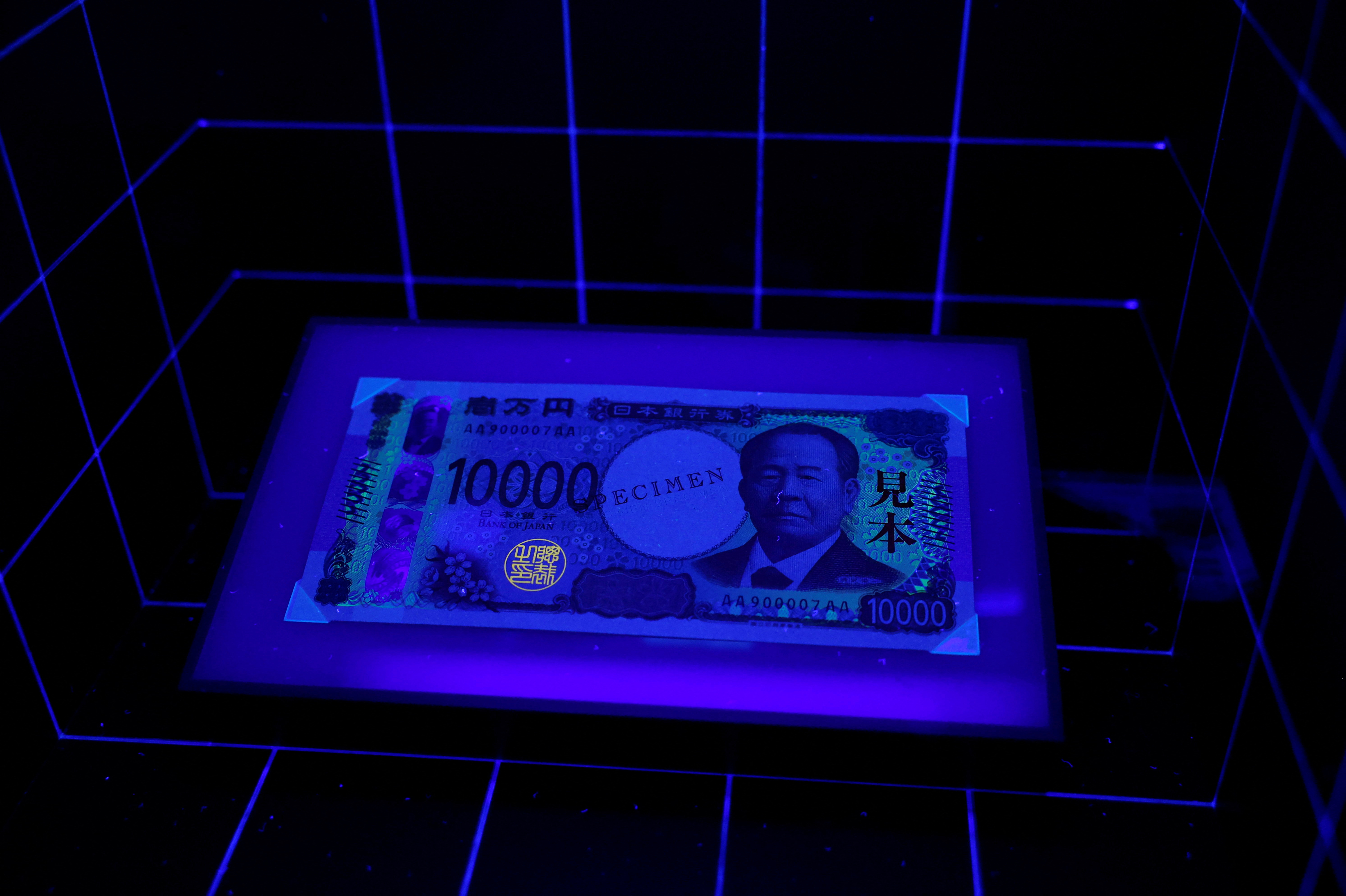Market News
High-tech cash: Japan launches banknotes with hologram portraits - REUTERS
TOKYO, July 3 (Reuters) - Japan began circulating its first new banknotes in 20 years on Wednesday, featuring three-dimensional portraits of the founders of financial and female education institutions in an attempt to frustrate counterfeiters.
The notes use printed patterns to generate holograms of the portraits facing different directions, depending on the angle of view, employing a technology that Japan's National Printing Bureau says is the world's first for paper money.
Advertisement · Scroll to continueReport this ad
"Faces of those representing Japan's capitalism, women's empowerment and technology innovation are on the new bills," Prime Minister Fumio Kishida said at a function.
The step comes just as the economy moves into a growth-driven phase for the first time in three decades, he added.
Key companies are raising workers' wages at the fastest rate in 33 years, but lingering inflation, fed by the rapid weakening of the yen currency, keeps consumption and the mood of business sluggish, recent economic data show.
Existing bills will stay in use, but train stations, parking lots and ramen shops are scrambling to upgrade payment machines as the government pushes consumers and businesses to use less cash in its bid to digitise the economy.
The new 10,000-yen ($62) note depicts Eiichi Shibusawa (1840-1931), the founder of the first bank and stock exchange, who is often called "the father of Japanese capitalism".
The new 5,000-yen bill portrays educator Umeko Tsuda (1864-1929), who founded one of the first women's universities in Japan, while the 1,000-yen bill features a pioneering medical scientist, Shibasaburo Kitasato (1853-1931).
While Kishida talked up the latest technology to fight counterfeiting, it is not a major problem in Japan. The 681 fake banknotes police detected in 2023 represented a sharp drop from a record high of 25,858 in 2004.
Authorities plan to print about 7.5 billion newly-designed bills by the end of the current fiscal year, swelling the 18.5 billion banknotes, worth 125 trillion yen, in circulation by December 2023.
Item 1 of 8 A sample of a new 10,000 Yen banknote is displayed under a light to demonstrate how it differs from a forgery at the currency museum of the Bank of Japan, on the day the new notes of 10,000 yen, 5,000 yen and 1,000 yen went into circulation, in Tokyo, Japan July 3, 2024. REUTERS/Issei Kato/Pool [1/8]A sample of a new 10,000 Yen banknote is displayed under a light to demonstrate how it differs from a forgery at the currency museum of the Bank of Japan, on the day the new notes of 10,000 yen, 5,000 yen and 1,000 yen went into circulation, in Tokyo, Japan July 3, 2024. REUTERS/Issei Kato/Pool Purchase Licensing Rights
"Cash is a secure means of payment that can be used by anyone, anywhere, and at any time, and it will continue to play a significant role" despite alternatives, said central bank governor Kazuo Ueda. The Bank of Japan has experimented with digital currencies, but the government has made no decision whether to issue a digital yen.
'NO SALES IMPACT'
The first renewal of paper money since 2004 spurred businesses to upgrade payment machines for cash-loving customers.
Cashless payments in Japan have almost tripled over the past decade to account for 39% of consumer spending in 2023, but still lag global peers and should rise to 80% to boost productivity, the government says.
Nearly 90% of bank ATMs, train ticket machines and retail cash registers are ready for the new bills, but only half of restaurant and parking ticket machines, the Japan Vending Machine Manufacturers Association said.
Almost 80% of the nation's 2.2 million drink vending machines also need upgrades, it added.
"It might take until year-end to respond to this," said Takemori Kawanami, an executive at ticket machine company Elcom. "That's too slow, but we are short of components," he added, as client orders for upgrades exceeded expectations.
Many Japanese fast-food restaurants such as ramen shops and beef bowl stores use ticket machines to cut labour costs, but some small business owners battling inflation are unhappy at the extra investment needed.
"The machine replacement has no sales impact, so it's only negative for us, on top of rising costs of labour and ingredients," said Shintaro Sekiguchi, who spent about 600,000 yen for ticket machines at three ramen shops he runs in Tokyo.
($1=161.6500 yen)









